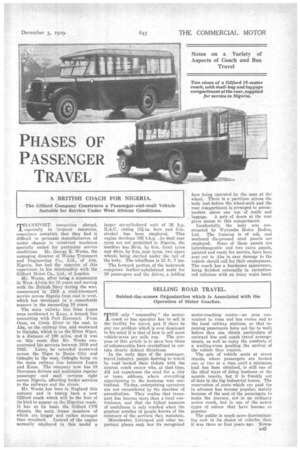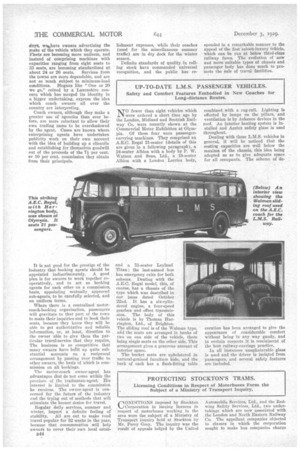SELLING ROAD TRAVEL.
Page 69

Page 70

If you've noticed an error in this article please click here to report it so we can fix it.
Behind-the-scenes Organization which is Associated with the Operation of Motor Coaches.
THEonly " commodity " the motorcoach or bus operator, has to sell is the facility for travel, and if there be any one problem which is ever dominant in his mind it is that of how to sell more vehicle-seats per mile run. The purpose of this article is to show how ideas of salesmanship have crystallized in certain clearly defined directions, • In the early days of the passengertravel industry, people desiring to travel by road booked their tickets with the nearest coach owner who, at that time, did not experience the need for a city or town address, where everything appertaining to the business was centralized. To-day, enterprising operators are not encumbered by the shackles of parochialism. They realize that transport has become more than a local convenience, and that the fullest measure of usefulness is only reached when the greatest number of people knows of the existence of the services they maintain.
Manchester, Liverpool and other important places each has its recognized
motor-coaching centre—an area convenient to tram and bus routes and to the local railway stations, so that incoming passengers have not far to walk before they can obtain particulars of outward bus and coach travel arrangements, as well as enjoy the comforts of a waiting-room pending the arrival of the vehicle they require.
The sale of vehicle seats at street stands, where passengers are booked one or two at a time until a minimum load has been obtained, is still one of the chief ways of doing business at the seaside resorts, but it is frankly out of date in the big industrial towns. The reservation of seats which are paid for in advance has become popular, mainly because of the zeal of the passengers to make the journey, not in an ordinary motor coach, but in one of the newer types of saloon that have become so popular.
The public is much more discriminating now in its choice of vehicles than it was three or four years ago. Nowa1343
days, westhave owners advertising the make of the vehicle which they operate. Fleets are becoming more uniform, and instead of comprising machines with capacities ranging from eight seats to 33 seats, are becoming standardized at about 24 or 26 seats. Services from the towns are more dependable, and are not so much subject to minimum-load conditions. Slogans like "One or 20 we go," coined by a Lancashire concern which has merged its identity in a bigger undertaking, express the idea which coach owners all over the country are interpreting.
Coach owners, although they make a greater use of agencies than ever before, are more reluctant to allow their own trading name to be overshadowed by the agent. Cases are known where enterprising agents have undertaken publicity work on their own account with the idea of building up a clientele and establishing for themselves goodwill out of the proceeds of the 71 per cent. or 10 per cent. commission they obtain from their principals.
lishment expenses, while their coaches (used for the miscellaneous summer traffic) are in dry dock for the winter season.
Definite standards of quality in rolling stock have commanded universal recognition, and the public has re
sponded in a remarkable manner to the appeal of the fast saloon-luxury Vehicle, which can be run at below third-class railway fares. The evolution of new and more suitable types of chassis and passenger body has done much to promote the sale of travel facilities.




















































































































